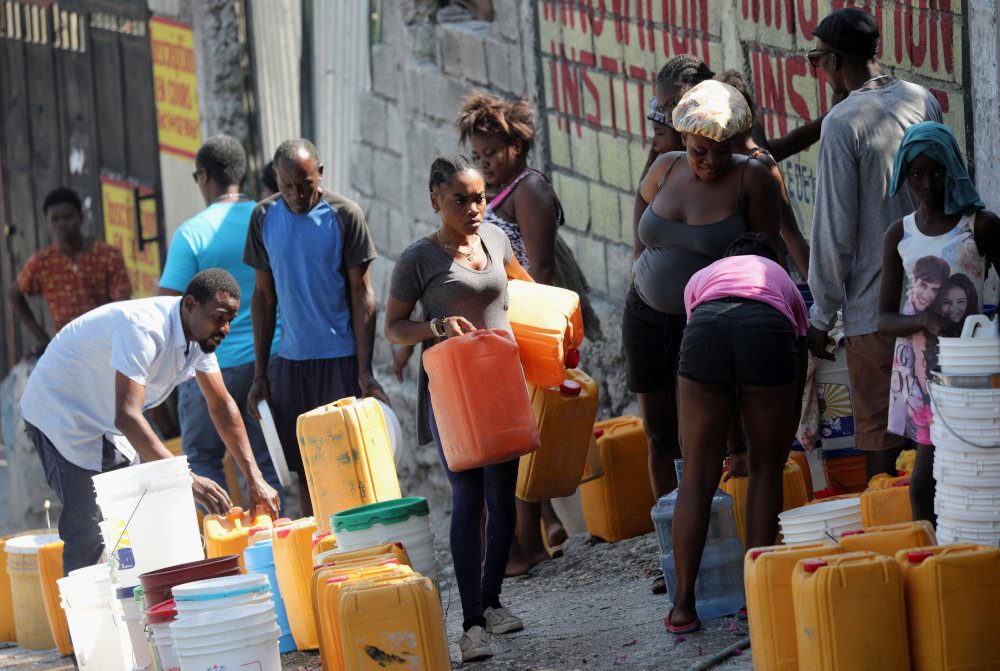SUMMARY
This is AI generated summarization, which may have errors. For context, always refer to the full article.

PORT-AU-PRINCE, Haiti – Haiti’s capital was calm on Wednesday, March 13, two days after the prime minister said he would step down, but the United States and the United Nations began to withdraw staff in a sign they fear peace might not hold.
Prime Minister Ariel Henry said on Monday he would resign once a transitional council takes over, following escalating violence by powerful gangs that has caused thousands to flee their homes.
US Secretary of State Antony Blinken, who met with regional Caribbean leaders and representatives from Haiti’s government and opposition in Jamaica this week, told reporters on Wednesday that he expects the transition council to come together in the next couple of days.
The Caribbean Community (CARICOM), a regional intergovernmental organization, has detailed the sectors, political parties and alliances to make up the nine-member council, but has not yet said who will be appointed.
However, Haiti’s most powerful gang leader, Jimmy “Barbeque” Cherizier, who had threatened to overthrow Henry, “dismissed” the transitional council, the Miami Herald reported on Wednesday. Reuters was not able to independently confirm Cherizier’s position.
A day earlier, several dozen protested against the transition plan, burning tires in downtown Port-au-Prince, but the city was for the most part calm.
Henry traveled to Kenya last month to secure Nairobi’s leadership of a long-delayed security mission to fight the gangs, which the UN believes control most of the capital. Violence escalated in his absence and he remained stranded in Puerto Rico when he resigned.
Blinken said on Wednesday he had received assurances from Kenyan President William Ruto that the African nation was prepared to lead the mission “as soon as this new council is stood up” and an interim prime minister is picked.
Many details on the security force, such as its size, who will contribute troops, its funding, and how it will operate on the ground, have not been decided. Countries have been wary of involvement after abuses in past interventions.
Although progress continues to lag, in Canada, like Haiti a former French colony, Prime Minister Justin Trudeau promised his country would remain “very, very active,” without specifying commitments.
Meanwhile, US Southern Command – a military branch encompassing Latin America and the Caribbean – said it was deploying a team of anti-terrorism Marines to bolster embassy security and help “non-emergency” personnel leave Haiti.
Non-essential United Nations staff are also set to start leaving Haiti because of the volatile security, according to a UN spokesperson, who did not say how many were considered non-essential. The body employs 267 international staff and 1,220 locals in Haiti.
Neither body commented on the reason for the specific timing of their departures.
In the US state of Florida, Governor Ron DeSantis, an anti-immigration hardliner, said state law enforcement would deploy more than 250 additional officers and soldiers and more than a dozen air and sea vessels to the southern coast “to protect our state.”
‘You cannot go anywhere’
Although many residents of Port-au-Prince resumed their business on Wednesday, buying produce from street vendors and collecting water in containers, people remain blocked from large parts of the capital that remain under gang control.
There was little sign of visible gang activity, however, and no new attacks reported on key infrastructure or government offices.
MSC said it had suspended all shipping calls at Haiti’s main cargo port terminal, which it said remained “not fully operational” after containers were looted. Shipments will be diverted to Caucedo in the Dominican Republic, it said.
“Things have gotten stranger. You cannot function. You cannot go around. You cannot go anywhere,” said Louis Jean Ezechiel, 31, from the hillside Petion-Ville district. “All other places in the country are inaccessible.”
American author Mitch Albom said he, his wife and eight others working at an orphanage in Haiti were evacuated overnight on Monday by helicopter with help from Republican lawmakers.
Haiti has long been impoverished and politically volatile, but has become increasingly lawless since the 2021 assassination of President Jovenel Moise, with the country’s outgunned police struggling to maintain security against increasingly powerful and brutal gangs and with protests against the unelected Henry.
James Boyard, a security expert at the State University of Haiti, said calls from some sectors in Haiti for an amnesty for gang leaders constituted “a deliberate strategy to make this idea more morally acceptable.”
If such an amnesty were issued, he said, this could see gangs’ alleged financial backers, who have been subjected to international sanctions, off the hook.
Haitian immigrants in New York voiced wariness of more international intervention and worry about family members facing insecurity back home, children who cannot go to school and a growing exodus of educated young people moving abroad.
Radio Soleil station director Ricot Dupuy said people were “cautiously optimistic” on the plan brokered with CARICOM in Jamaica but feared if the gangs remained uncontrollable, more people would flee the country.
The UN estimates more than 360,000 people have been internally displaced and thousands killed amid food shortages and widespread reports of rape, torture, arson, ransom kidnappings by gang members.
“Haiti has been transformed into hell and the international community contributed significantly to that,” Dupuy said. “When a house is on fire, you can put all the police, all the guns you want, but I’m not going to stay in a house that is burning. I’m going to run. And when I run, I won’t care where I go.” – Rappler.com
Add a comment
How does this make you feel?
There are no comments yet. Add your comment to start the conversation.